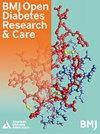Longitudinal changes in diet quality and food intake before and after diabetes awareness in American adults: the Coronary Artery Risk Development in Young Adults (CARDIA) study
IF 3.7
2区 医学
Q2 ENDOCRINOLOGY & METABOLISM
引用次数: 0
Abstract
Introduction Limited longitudinal research is available examining how American adults make dietary changes after learning they have diabetes. We examined the associations between diabetes awareness and changes in dietary quality and food intake in a prospective cohort from the Coronary Artery Risk Development in Young Adults (CARDIA) study. Research design and methods A nested case-control design was used. In the original CARDIA study, black and white participants were recruited from four US urban areas and partitioned into one control group (no diabetes over 30-year follow-up) and three case groups (early-onset, intermediate-onset, later-onset diabetes groups) based on timing of diagnosis and first awareness of diabetes. Estimated mean A Priori Diet Quality Score (APDQS), and food subgroup intake were examined at three CARDIA examinations (year (Y)0, Y7, and Y20). The mean APDQS with 95% CIs and food intake (servings/day) were compared across the one control group and three case groups using exam-specific and repeated measures linear regression. Results Among 4576 participants (mean age: 25±4 years; 55% female; 49% black race), 653 incident cases (14.3%) of diabetes were observed over 30 years. APDQS was lowest at Y0 when the diabetes-free participants were aged 18–30 years (61.5–62.8), but increased over 20 years with advancing age across all groups (64.6–73.3). Lower APDQS in young adulthood was associated with a higher incidence of diabetes later in life. Diabetes awareness was associated with a net increase of 2.95 points in APDQS. The greatest increase of APDQS was when people learned of their diabetes for the first time (an increase of 5.71 in early-onset and 6.64 in intermediate-onset diabetes groups, respectively). Conclusions Advancing age and diabetes awareness were associated with more favorable dietary changes leading to improved diet quality. Optimal diet quality and healthy food intake in young adulthood seem important to prevent diabetes later in life. Data are available on reasonable request after the approval of the CARDIA P&P committee.美国成年人认识糖尿病前后饮食质量和食物摄入量的纵向变化:年轻人冠状动脉风险发展(CARDIA)研究
导言:关于美国成年人在得知自己患有糖尿病后如何改变饮食习惯的纵向研究十分有限。我们从青年冠状动脉风险发展(CARDIA)研究的前瞻性队列中考察了糖尿病认知与饮食质量和食物摄入量变化之间的关联。研究设计和方法 采用巢式病例对照设计。在最初的 CARDIA 研究中,从美国四个城市地区招募了黑人和白人参与者,并根据诊断和首次发现糖尿病的时间分为一个对照组(随访 30 年无糖尿病)和三个病例组(早发、中发、晚发糖尿病组)。在三次 CARDIA 检查(第 0 年、第 7 年和第 20 年)中对估计的平均 A Priori 饮食质量得分(APDQS)和食物亚组摄入量进行了检查。使用特定考试和重复测量线性回归法比较了一个对照组和三个病例组的平均 APDQS 和 95% CIs 以及食物摄入量(份/天)。结果 在 4576 名参与者(平均年龄:25±4 岁;55% 为女性;49% 为黑人)中,观察到 653 例(14.3%)糖尿病病例发生于 30 年前。在 18-30 岁无糖尿病的参与者中,APDQS 在 Y0 时最低(61.5-62.8),但在 20 年中,随着年龄的增长,所有组别均有所上升(64.6-73.3)。年轻时较低的 APDQS 与日后较高的糖尿病发病率有关。对糖尿病的认识与 APDQS 净增加 2.95 分有关。当人们第一次知道自己患有糖尿病时,APDQS的增幅最大(早发糖尿病组和中发糖尿病组分别增加了5.71分和6.64分)。结论 年龄的增长和糖尿病认知度的提高与更有利的饮食变化相关,从而改善饮食质量。年轻时的最佳饮食质量和健康的食物摄入对于预防日后的糖尿病似乎非常重要。经 CARDIA P&P 委员会批准后,可根据合理要求提供数据。
本文章由计算机程序翻译,如有差异,请以英文原文为准。
求助全文
约1分钟内获得全文
求助全文
来源期刊

BMJ Open Diabetes Research & Care
Medicine-Endocrinology, Diabetes and Metabolism
CiteScore
9.30
自引率
2.40%
发文量
123
审稿时长
18 weeks
期刊介绍:
BMJ Open Diabetes Research & Care is an open access journal committed to publishing high-quality, basic and clinical research articles regarding type 1 and type 2 diabetes, and associated complications. Only original content will be accepted, and submissions are subject to rigorous peer review to ensure the publication of
high-quality — and evidence-based — original research articles.
 求助内容:
求助内容: 应助结果提醒方式:
应助结果提醒方式:


